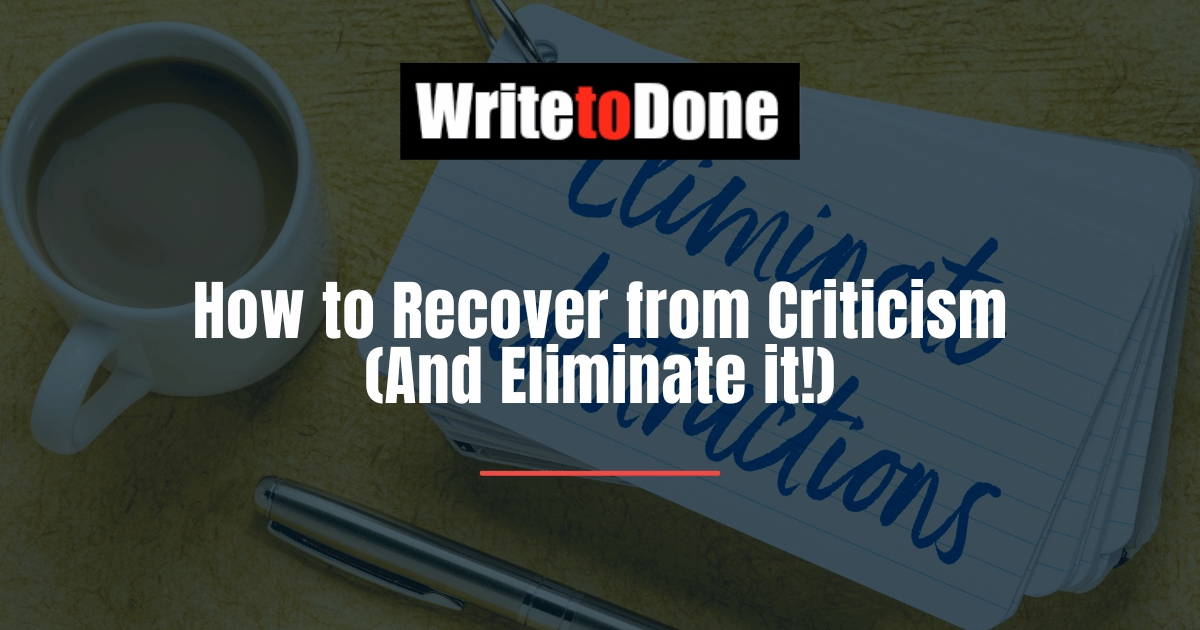Have you ever felt the need to voice a harsh opinion about someone’s writing or other creative work—even though your input wasn’t asked for?
And did you ever deliver such criticism with facetiousness, sarcasm, or worse, outright malice?
Be honest.
Don’t worry, no one will know.
If yes, the next question is very important.
Why?
Because it was the right thing to do? Because certain standards must be met and maintained?
Or maybe it was because it made you feel better?
Or, and we might be getting a lot closer here, it was impulsive and you don’t really know why.
If you’ve ever felt the compulsion to correct someone’s typo when your input was not requested, yet you went the extra mile and delivered said criticism in the harshest way you could, then trust me when I say that it never was about the other person’s mistake.
Destructive criticism is NEVER about anyone but the giver.
The reality is that when we feel an instinctive, unyielding need to strongly criticize someone else, it’s not about them. Such an intense compulsion comes from within ourselves. It’s all too often a sign of a simmering anger we have about our own flaws, our own mistakes, and our own imperfection.
There is no critic in the world harder on you than yourself.
You know it’s true.
This post might not be about you, but if you’ve ever felt the need to criticize someone else for an error that is irrelevant in the great scheme of things, there is something deeper at work, something far more sinister and hurtful.
It’s your internal naysayer lashing out. It’s really talking about you and your work.
Now here’s the clincher, your internal naysayer is a liar. It’s never honest. It wants you to feel unqualified and worthless, unworthy and not good enough.
It’s bullshitting you.
You are worthy.
There is a great artist–a great writer–within you.
Don’t let your internal critic convince you otherwise.
Writer’s Doubt is never fair. It will try to fool you, mask its criticism, and try to convince you that it’s all about someone else—anyone else—but ultimate its trickery will affect only you. (Although, be aware that someone else’s feelings could get hurt in the crossfire.)
Don’t let it trick you. Put it in its place.
Here are 3 tips on how to turn the tables on your internal naysayer and strengthen your confidence in your own work:
1. Use a compliment.
The next time you spot an error in someone’s writing and feel a devious impulse to let that person know how much of an idiot they are, turn the tables on your naysayer and send a compliment instead.
Find something interesting about their writing and send an encouraging note.
Remember, your internal critic is really attacking you, so your note is as much for you as it is for the writer you’re sending it to.
2. Use a positive affirmation.
Repeat after me: “I am a writer. I create work that matters. I matter.”
Whenever you feel the need to criticize someone else’s work for no other reason than just to do it, say with authority: “I am a writer. I create work that matters. I matter.”
Repeat it as often as you need to, until the compulsion to destructively criticize someone is gone.
I also recommend posting this statement somewhere you can read it regularly, perhaps on a post-it next to your PC monitor.
3. Keep a good attitude.
Adopt a ‘Be Graceful and Be Kind’ attitude.
We’re hard enough as it is on ourselves; there’s no reason to be hard on others too.
Of course, people want to know when they’ve made an error so they can correct it and learn from their mistake, but there’s a graceful and kind way to do it, and a hurtful way to do it. You know the difference, because you know how it feels.
Your naysayer will recoil and hide from grace and kindness, allowing you the freedom to flourish as a writer and as a person, and perhaps your generous feedback and compliments will help fellow writers do the same.
One more thing, whenever you’re on the receiving end of criticism that wasn’t requested and it’s obviously just a poke at you for your mistake, know that it’s not about you.
The person who gave it is dealing with powerful internal demons and he or she just lost a major battle. Getting upset or arguing will only serve to upset you even more and embolden that person’s internal naysayer.
I’ve found sending a silent good thought—akin to a prayer— to that person removes any animosity and hurt I might be feeling. And hopefully, it helps them too.
You are a writer. Yes, you are.
You create work that matters. You matter. Yes, you do.
Have you ever given hurtful criticism that you later regretted? Share with us in the comments how it made you feel. How would you give that criticism now? If you like, share an example of this as well.
Did you like this post? Please share it on social media!
















